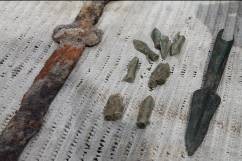
For Immediate Release
On July 2nd, USAID opened two newly rehabilitated roads in Shida Kartli that are expected to benefit more than 15,000 residents.
The Gori Jvari Road will provide access to the Gori Jvari Monastery, one of the most important cultural sites in the country. Every year, thousands of Georgians visit the site to celebrate feasts of St. George. The Sagholasheni Dvani Road, which has existed since ancient times, was originally one of the main lines connecting the Shida Karti and Dvaleti providences of Georgia. The modern renovation of the 13 kilometers of this road will provide direct access to the main national east-west highway for the villages of Sagholasheni, Tsveri, Breti, Dirbi, and Dvani, directly benefitting 9,500 people.
Through the USAID funded Municipal Infrastructure and Housing Rehabilitation Project, USAID is helping Georgians affected by conflict and economic hardship by renovating infrastructure that they depend on. Infrastructure such as roads, water and sanitation, and irrigation systems are being renovated as well as apartment buildings where they can live. The work supported through this project is particularly focused on supporting internally displaced persons.
During the road construction USAID discovered the historical remains of an ancient community and burial grounds close to the town of Dvani. Through the collaboration of many project participants, the site was archaeologically excavated in May, 2013. Artifacts included clay pottery, bronze and metal weapons, glass jewelry, and golden and bronze items. Nineteen cultural findings were ultimately discovered, studied and documented, and now reside at the Tbilisi State University museum.







Comment
Make a general inquiry or suggest an improvement.